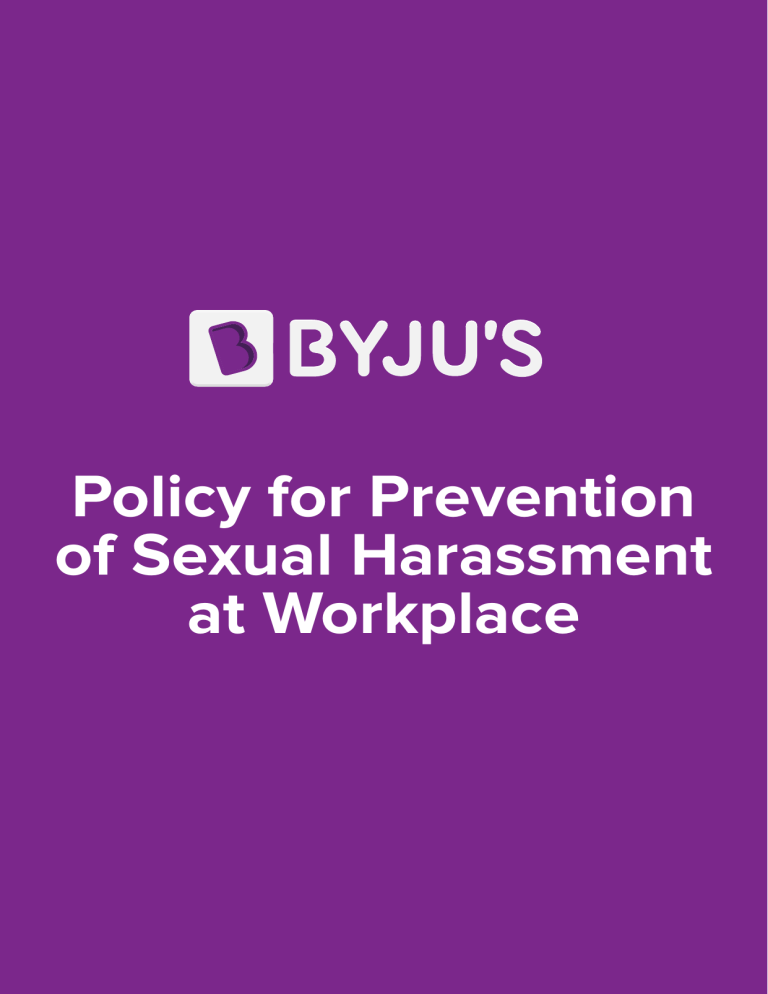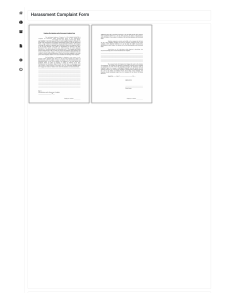
Policy for Prevention of Sexual Harassment at Workplace Policy for Prevention of Sexual Harassment at Workplace Contents Purpose 3 Scope 3 Definition of Sexual Harassment 3 Responsibilities Regarding Sexual Harassment 4 Internal Committee 4 Procedure for Complaint 4 Procedure for Inquiry 5 Confidentiality 6 Protection to Complainant / Victim 6 2 Purpose Sexual harassment at the workplace or any place other than the workplace if involving employees is a grave offence under the Sexual Harassment of Women in the Workplace (Prevention, Prohibition and Redressal) Act, 2013 and is, therefore, punishable. The objective of this policy is to provide protection against sexual harassment to all the employees at workplace and to redress any complaint filed by any of its employees for sexual harassment and for matters connected therewith or incidental thereto. Scope This policy applies to all categories of employees of the company, including permanent workforce, workmen, temporaries, trainees and employees on contract at their workplace or at client sites (Employee). The workplace includes: 1. All offices or other premises where the company’s business is conducted. 2. All company-related activities performed at any other site away from the company’s premises. 3. Any social, business or other functions where the conduct or comments may have an adverse impact on the workplace or workplace relations. Definition of Sexual Harassment Sexual harassment includes any one or more of the following unwelcome acts or behaviour (whether directly or by implication) namely: 1. Physical contact and advances 2. Demand or request for sexual favours 3. Making sexually coloured remarks 4. Showing pornography 5. Any other unwelcome physical, verbal or non-verbal conduct of sexual nature The following circumstances may also amount to sexual harassment: 1. Implied or explicit promise of preferential treatment in the Employee’s employment 2. Implied or explicit threat of detrimental treatment in the Employee’s employment 3. Implied or explicit threat about the victim’s present or future employment status 4. Interferes with the Employee’s work or creating an intimidating or offensive or hostile work environment for her 5. Humiliating treatment likely to affect the victim’s health or safety 3 Responsibilities Regarding Sexual Harassment All Employees of the company have a personal responsibility to ensure that their behaviour is not contrary to this policy. All Employees are encouraged to reinforce the maintenance of a work environment free from sexual harassment. Internal Committee 1. The company has constituted an Internal Committee for redressal of sexual harassment complaints (made by the victim) and for ensuring time bound resolution of such complaints. The Internal Committee comprises of the following four members, and will function from the Company’s office situated at BYJU'S (Think & Learn Pvt. Ltd.), 2nd Floor, Tower D, IBC Knowledge Park, 4/1, Bannerghatta Main Road Bangalore- 560029, Bangalore. • Ms. Deeptha A R (Presiding Officer) • Mr. Pravin Prakash (Member) • Ms. Abirame Periyasamy (Member) • Ms. Junia Sebastian (External Member) 2. The Internal Committee is responsible for: • Investigating every formal written complaint of sexual harassment • Taking appropriate remedial measures to respond to any substantiated allegations of sexual harassment • Discouraging and preventing employment-related sexual harassment Procedure for Complaint 1. Any Employee who feels that he / she is being sexually harassed may submit a complaint of the alleged incident to any member of the Internal Committee in writing or via email (to safe@byjus.com), within 90 days of occurrence of incident. This can be further extended by another 3 months, which will be at the discretion of the Internal Committee. The Employee is required to disclose their name, department, division and location they are working in, to enable the Presiding Officer to contact them and take the matter forward. 2. Complaints can also be submitted by a legal heir/relative, if they have been authorized by the victim to do so. 3. The Internal Committee will maintain a register to endorse the complaint received by it and keep the contents confidential, if it is so desired, except to use the same for discreet investigation. 4. The Internal Committee will hold a meeting with the complainant within five days of the receipt of the complaint. 5. At the first meeting, the Internal Committee members shall hear the complainant and record allegations. The complainant can also submit any corroborative material with a documentary proof, oral or written material, to substantiate the complaint. If the complainant does not wish to depose personally due to embarrassment of narration of event, a member of the Internal Committee having the same gender as the complainant, shall meet and record the statement. 4 6. Thereafter, the person against whom complaint is made may be called for a deposition before the Internal Committee and an opportunity will be given to him / her to give an explanation, where after, an “inquiry” shall be conducted and concluded. 7. In the event, the complaint does not fall under the purview of sexual harassment or the complaint does not mean an offence of sexual harassment, the same would be dropped after recording the reasons thereof. 8. The Internal Committee, before initiating an inquiry, upon the request of the complainant, may take steps to settle the matter through conciliation. 9. In case the complaint is found to be false, the complainant shall, if deemed fit, be liable for appropriate disciplinary action by the management. For further clarity regarding the resolution procedure, please refer Annexure A Procedure for Inquiry 1. The Internal Committee shall immediately proceed with the Inquiry and communicate the same to the complainant and person against whom complaint is made. 2. The Internal Committee shall prepare and hand over the statement of the allegation to the person against whom complaint is made within 7 days from the date of receipt of the complaint by the IC and give him / her an opportunity to submit a written explanation along with supporting documents and names and addresses of witnesses if he / she so desires within 10 days of receipt of the same. 3. The complainant shall be provided with a copy of the written explanation submitted by the person against whom complaint is made. 4. If the complainant or the person against whom complaint is made desires any witnesses to be called, they shall communicate in writing to the Internal Committee the names of witnesses whom they propose to call. 5. If the complainant desires to tender any documents by way of evidence before the Internal Committee, he / she shall supply original copies of such documents. Similarly, if the person against whom complaint is made desires to tender any documents in evidence before the Internal Committee, he / she shall supply original copies of such documents. Both shall affix his / her signature on the respective documents to certify these to be original copies. 6. The Internal Committee shall call upon all witnesses mentioned by both the parties. 7. The Internal Committee shall provide every reasonable opportunity to the complainant and to the person against whom complaint is made, for putting forward and defending their respective case. 8. The Internal Committee shall conduct such investigations in a timely manner and shall submit a written report containing the findings and recommendations to the Management as soon as practically possible and in any case, not later than 90 days from the date of receipt of the complaint. 9. The Management will ensure corrective action on the recommendations of the Internal Committee and keep the complainant informed of the same. Corrective action may include any of the following: 5 • Formal apology • Counselling • Written warning to the perpetrator and a copy of it maintained in their employee file • Change of work assignment / transfer for either the perpetrator or the victim • Suspension or termination of services of the Employees found guilty of the offence • In case the complaint is found to be false, the Complainant shall, if deemed fit by the Management, be liable for appropriate disciplinary action 10. In case the Internal Committee finds the degree of offence coverable under the Indian Penal Code, then this fact shall be mentioned in its report and appropriate action shall be initiated by the management, for making a police complaint. 11. If the complainant has already filed a complaint with the police, the internal investigation will still take place. 12. Where sexual harassment occurs as a result of an act or omission by any third party or outsider, the company shall take all steps necessary and reasonable steps to assist the affected person in terms of support and preventive action. 13. The Internal Committee shall be governed by such rules as may be framed under the Sexual Harassment of Women in the Workplace (Prevention, Prohibition and Redressal) Act, 2013. Confidentiality All records of complaints, including contents of meetings, results of investigations and other relevant material will be kept confidential by the company except where disclosure is required under disciplinary or other remedial processes. Protection to Complainant / Victim The company is committed to ensuring that no Employee who brings forward a sexual harassment concern is subject to any form of reprisal. Any reprisal will be subject to disciplinary action. The Company will ensure that the victim or witnesses are not victimized or discriminated against while dealing with complaints of Sexual Harassment. However, anyone who abuses the procedure (for example, by maliciously putting an allegation knowing it to be untrue) will be subject to disciplinary action. 6 ANNEXURE A Process of Filing a Complaint Internal complaint committee to notify the respondent of the complaint within 7 days of receipt of the complaint Aggrieved person to file a complaint to safe@byjus.com within 90 days of the alleged incident ICC conducts enquiry within 90 days of the response No Does respondent accept charges? Yes Company to act on ICC report within 60 days of receipt of the report. ICC drafts findings and compiles reports Appeal to court/ tribunal No Do parties agree with action? Yes Resolved 7 Respondent to revert within 10 days of receipt of notification

